PEOPLE IN AMERICA - William Faulkner, Part 2
00.7.010310_3.People in America
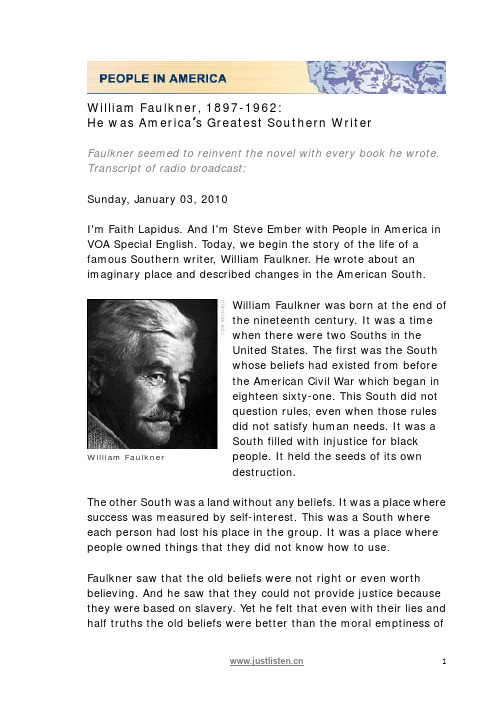
William Faulkner, 1897-1962:He was America’s Greatest Southern WriterFaulkner seemed to reinvent the novel with every book he wrote. Transcript of radio broadcast:Sunday, January 03, 2010I'm Faith Lapidus. And I'm Steve Ember with People in America in VOA Special English. Today, we begin the story of the life of a famous Southern writer, William Faulkner. He wrote about an imaginary place and described changes in the American South.William Faulkner was born at the end of Array the nineteenth century. It was a timewhen there were two Souths in theUnited States. The first was the Southwhose beliefs had existed from beforethe American Civil War which began ineighteen sixty-one. This South did notquestion rules, even when those rulesdid not satisfy human needs. It was aSouth filled with injustice for blackpeople. It held the seeds of its own William Faulknerdestruction.The other South was a land without any beliefs. It was a place where success was measured by self-interest. This was a South where each person had lost his place in the group. It was a place where people owned things that they did not know how to use.Faulkner saw that the old beliefs were not right or even worthbelieving. And he saw that they could not provide justice becausethey were based on slavery. Yet he felt that even with their lies and half truths the old beliefs were better than the moral emptiness ofthe modern South.In Faulkner's story called "The Bear" agroup of men are talking after the day'shunt. One man reads from a poem by theEnglish writer, John Keats:"'She cannot fade, though thou has notthy bliss, Forever wilt thou love, and shebe fair.'"He's talking about a girl," one man says.The other answers, 'He was talking about truth. Truth is one. It doesn't change. It covers all things which touch the heart -- honor and pity and justice and courage and love. Do you see now.'"The American writer, Robert Penn Warren says about Faulkner, "The important thing is the presence of the idea of truth. It covers all things that involve the heart and define the effort of man to rise above the mechanical process of life. "Faulkner has been accused of looking back to a time when life was better. Yet, he believes that truth belongs to all times. But it is found most often in the people who stand outside what he calls "the loud world."One of the people in his story "Delta Autumn" says, "There are good men everywhere, at all times."Faulkner's great-grandfather accepted the old beliefs. He was one of the men who had helped build the South, but his time was gone. Now money had replaced the old order of honor. What Faulkner saw was that there could be no order at all, no idea of doing what is right, in a world that measured success in terms of money.This is the changing South that Faulkner describes in the area he created. He named it Yoknapatawpha County. He describes it as inthe northern part of the state of Mississippi. It lies between sand hills covered with pine trees and rich farmland near the Mississippi River. It has fifteen-thousand-six-hundred-eleven people, living on almost four-thousand square kilometers. Its central city is Jefferson, where the storekeepers, mechanics, and professional men live.The rest of the people of Yoknapatawpha County are farmers or men who cut trees. Their only crops are wood and cotton. A few live in big farmhouses, left from an earlier time. Most of them do not even own the land they farm.The critic Malcolm Cowley says, "Others might say that Faulkner was not so much writing stories for the public as telling them to himself. It is what a lonely child might do, or a great writer. " William Faulkner was born in New Albany, Mississippi, ineighteen-ninety-seven. His father worked for the railroad. William's great-grandfather had built it. His grandfather owned it. When the grandfather decided to sell the railroad, William's father moved his family thirty-five miles west to the city of Oxford.Growing up in Oxford, William Faulknerheard stories of the past from hisgrandmother and from a black womanwho worked for his family. He heardmore stories from old men in front ofthe courthouse, and from poor farmerssitting in front of a country store.You learn the stories, Faulkner says,without speech somehow from having been born and living beside them, with them, as children will and do.Faulkner was a good student. Yet by the time he was fifteen he had left school. Except for a year at the University of Mississippi at the end of World War One, that was the last of his official education. He took a number of jobs in Oxford, but did not stay with any ofthem. He began to think that he was a writer. Then innineteen-eighteen the woman he loved married another man. Faulkner left Mississippi and joined the British Royal Flying Corps. He was sent to Canada to train to fight in World War One.The war ended before he could be sent to Europe. He returned to Oxford, walking with difficulty because of what he said was a "war wound."At home Faulkner again moved from one job to the next. He wrote bad poetry, drew pictures that looked like other men's pictures, and wrote uninteresting stories. A book of his poetry, The Marble Faun, was published in nineteen-twenty-four.A year later he went to the Southern city of New Orleans, Louisiana. There he met the American writer, Sherwood Anderson. They became friends. Anderson told Faulkner to develop his own way of writing, and to use material from his own part of the country. He also told Faulkner he would find a publisher for the novel Faulkner was writing. But Anderson also told Faulkner that he would not read the book.The book was called “Soldier's Pay.” It would not be remembered today if it were not for Faulkner's later work. The same could be said of Faulkner's next book, “Mosquitoes.”Money from these books made it possible for him to travel to Europe. He educated himself by reading a large number of modern writers. Among them was the Irish writer James Joyce. From him, Faulkner learned to write about people's inner thoughts. He also read the books of the Austrian doctor, Sigmund Freud. From him, Faulkner learned some of the reasons people act in the strange way they often do.Instead of remaining in Paris, as many American writers did, Faulkner returned to Mississippi and began his serious writing. "I was trying," he said, "to put the history of mankind in one sentence. " Later he said, "I am still trying to do it, but now I want to put it allon the head of a pin." He created Yoknapatawpha County and its people, and gave them a meaning far beyond their place and lives.In nineteen-twenty-nine Faulkner married Estelle Oldham, the woman he had loved since they were in school together. Her earlier marriage had failed. She had returned to Oxford with her two children.They bought an old ruined house and began the costly work of repairing it. Faulkner also took on the job of supporting the rest of his family. His letters from this time on are often full of talk about what he must do to support his family and to continue the repairs to his house.Faulkner's next book, “Sartoris,” presents almost all the ideas that he develops during the rest of his life. First, however, the book Faulkner wrote had to be cut by about twenty-five percent. Faulkner resisted. He said, if you grow a vegetable, you can cut it to look like something else, but it will be dead. Yet, when Faulkner read the book after his editor cut it, he approved. He even cooperated in more re-shaping of the book.In “Sartoris,” Faulkner found his subject, his voice, and his area. He writes about the connection between an important Southern family and the local community. He describes how the Sartoris family seems to help in its own destruction.In the next seven years, between nineteen-twenty-nine and nineteen-thirty-six, he seemed to re-invent the novel with every book he wrote. "Get it down," he said. "Take chances. It may be bad, but that's the only way you can do anything good. "At that time, most novels about the South described a land that never existed. After Faulkner, few northerners were brave enough to write about a South they did not know. And no serious Southern writer was willing to describe a South that did not exist.This program was written by Richard Thorman. It was produced by Lawan Davis. I'm Steve Ember. And I'm Faith Lapidus. Join us again next week for the rest of the story about William Faulkner on People in America in VOA Special English.。
William Faulkner 威廉福克纳

William Faulkner was born on September 25, 1897 and was died on July 6, 1962. He was an American writer and Nobel Prize laureate from Oxford, Mississippi.
• 威廉· 福克纳生于1897年9月25日,出身名门望族,全名威廉· 卡 斯伯特· 福克纳。支配这个家族想象力的是福克纳的曾祖父威 廉· 克拉科· 福克纳老上校。他既是种植园主,又是军人、作家、 政治家。他 • 威廉· 福克纳 • 还是经营铁路的企业家,他修的铁路是当地唯一的铁路。牛津小 镇留下老上校鲜明的痕迹。老上校死后,坟头矗立起一座8英尺 高的意大利大理石雕像。讲老上校的传奇故事成为人人参与的一 项仪式。州内一个镇也是以他的名字福克纳来命名。他还著有几 本小说和其他一些作品,这种文学传统一直在家中传承了下来。 福克纳作品中的“约翰· 萨托里斯上校”就是在他曾祖父的基础 上创作而来的。
但是威廉· 福克纳的父亲却被普遍认为是一个
不肖子孙,他的工作换了一个又一个,却永 远找不到自己的安身立命之地。但福克纳为 他的母亲自豪,她意志坚定,自尊心强。屡 屡失败的父亲与坚强自尊的母亲势不两立。
Works
• • • • • • • • • • • • • • • • • • • • 《士兵的报酬》 (Soldiers' Pay)(1926) 《蚊群》(Mosquitoes)(1927) 《萨托里斯》(Sartoris)(1929) 《喧哗与骚动》(The Sound and the Fury)(1929) 《我弥留之际》(As I Lay Dying)(1930) 《圣殿》(Sanctuary)(1931) 《八月之光》(Light in August)(1932) 《塔门》(Pylon)(1935) 《押沙龙,押沙龙!》(Absalom, Absalom!)(1936) 《不败者》(The Unvanquished)(1938) 《野棕榈》 (The Wild Palms))(1939) 《村子》(The Hamlet)(1940) 《去吧,摩西》(Go Down, Moses)(1942) 《闯入坟墓的人》(Intruder in the Dust)(1948) 《修女安魂曲》(Requiem for a Nun)(1951) 《寓言》(A Fable )(1954) 《镇》(The Town)(1957) 《大宅》(The Mansion)(1959) 《掠夺者》(The Reivers)(1962) 《坟墓里的旗帜》( Flags in the Dust ) (1973)
威廉福克纳 介绍William Faulkner

(P3)人们必须重温这些,必须教会自己:一切事物中最基 本的东西才最值得敬畏;并且,还要教会自己,没齿不忘, 永远在自己的工作室里为亘古不变的心灵的真理留出位置; 离开这些亘古不变的真理,任何小说都注定如浮游朝菌生 命一般地短暂 - -爱或荣誉或怜悯或自豪或同情或牺牲。 如果不这样做,他的一切劳作都会受到魔咒。 他所描绘 的不是爱情而是肉欲,他所记述的失败里不会有人失去任 何有价值的东西,他所描绘的胜利中也没有希望,更没有 同情和怜悯。他的悲哀,缺乏普遍的基础,留不下丝毫痕 迹。他所描述的不是人类的心灵,而是人类的内分泌物。
Main idea
3.Man will not merely endure, he will prevail. He is immortal because he has a soul, a spirit capable of compassion and sacrifice and endurance. (Para.4)
Main idea
1.Only the human heart in conflict with itself is worth writing. (Para.2)
2.The basest of all things is to be afraid. Writers should remember forever that good writing reflects the old verities and truths of the heart, the old universal truths—love and honor and pity and pride and compassion and sacrifice. (Para.3)
福克纳William_Faulkner简介
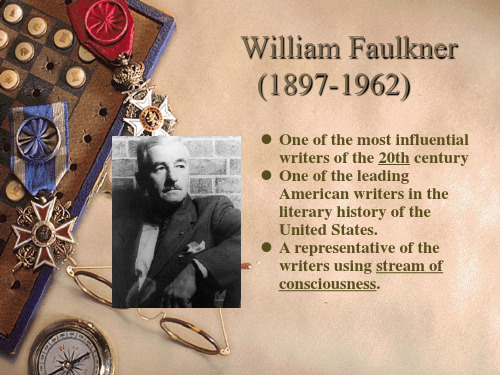
1929, two novels: Sartoris, The Sound and the Fury 1929-1942, most productive: 2 short-story collections, a
Mr. Compson is an alcoholic. Mrs. Compson is a selfabsorbed hypochondriac who depends almost entirely upon Dilsey to raise her four children. Quentin, the oldest child, is a sensitive bundle of neuroses. Caddy, his sister, is stubborn, but loving and compassionate. Quentin commited suicide after Caddy's losing her virginity and their family's decline. Jason has been difficult and mean-spirited since birth and is largely spurned by the other children. Benjy is severely mentally disabled, an “idiot” with no understanding of the concepts of time or morality.
Part1: Benjy (the youngest son), a fool Part 2: Quentin (the oldest son),a suicide Part 3: Jason (the second son),a cynical man Part 4: Dilsey (the maid), the omniscient view
美国文学 作家 威廉·福克纳

Of Faulkner's literary works, four novels are masterpieces by any standards: The Sound and the Fury, Light in August, Absalom, Absalom! and Go Down, Moses. The Sound and the Fury is his acclaimed masterpiece, an account of the tragic downfall of the Compson family.
“The Sound and the Fury” : a Southern Gothic novel, which makes use of the stream of consciousness narrative technique pioneered by European authors such as James Joyce and Virginia Woolf. The novel takes place in the fictional Yoknapatawpha County and is split into four sections: the first from the viewpoint of Benjy Compson, a mentally retarded man; the second from the point of view of Quentin Compson, a depressed college student; the third from the point of view of their sardonic, embittered brother, Jason Compson; and the fourth section from a third person limited omniscient narrative point-of-view, centering on Dilsey, the Compson family's black servant, and expounding on religious faith. Benjy and Quentin's sections are written in a stream of consciousness style.
William Faulkner
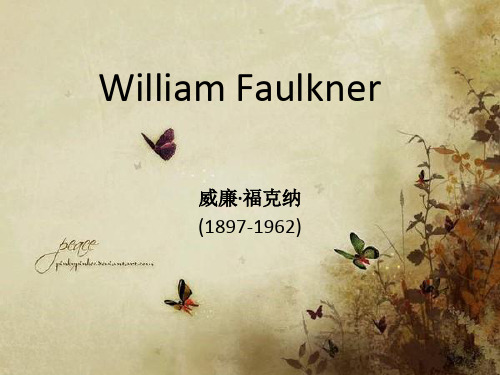
by 崔凤桐
不管在什么地方,只要谈到美国文学,人们都认 为威廉·福克纳(William Faulkner)是二十世纪最伟 大的作家之一。他是美国“南方文学”派的创始 人,也是整个西方最有影响的现代派小说家之一。
His major works
小说
《士兵的报酬》 (Soldiers' Pay)(1926) 《蚊群》(Mosquitoes)(1927) 《萨托里斯》(Sartoris)(1929) 《喧哗与骚动》(The Sound and the Fury)(1929) 《我弥留之际》(As I Lay Dying)(1930) 《圣殿》(Sanctuary)(1931) 《八月之光》(Light in August)(1932) 《塔门》(Pylon)(1935) 《押沙龙,押沙龙!》(Absalom, Absalom!)(1936) 《不败者》(The Unvanquished)(1938) 《野棕榈》(If I Forget Thee Jerusalem (The Wild Palms/Old Man))(1939) 《村子》(The Hamlet)(1940) 《去吧,摩西》(Go Down, Moses)(1942) 《闯入坟墓的人》(Intruder in the Dust)(1948) 《修女安魂曲》(Requiem for a Nun)(1951) 《寓言》(A Fable )(1954) 《镇》(The Town)(1957) 《大宅》(The Mansion)(1959) 《掠夺者》(The Reivers)(1962)
“约克纳帕塔法世系”
• 这个“世系”以美国南方几个庄园主世家的荣 辱兴衰为主线,表现了一个世纪以来美国南方社 会的历史命运、社会变迁以及各阶层人物的起伏 沉浮,写出了美国南方地区的典型特征,具有浓 厚的乡土气息。福克纳以密西西比河畔一个名为“ 约克纳帕塔瓦”虚构的地方为背景创作了一系列作 品。以看似未经修饰的人物的思维轨迹为线索来 叙事,以此来揭示人物最真实的内心世界。这一 技巧在文学史上被称为“意识流”。作家还经常打 乱时间顺来叙事,用以揭示过去和现实之间的联 系.
英语故事-William Faulkner

英语故事William Faulkner威廉·福克纳,美国文学史上最具影响力的作家之一,意识流文学在美国的代表人物,1949年诺贝尔文学奖得主,获奖原因为“因为他对当代美国小说做出了强有力的和艺术上无与伦比的贡献”。
William FaulknerWilliam Faulkner (September 25, 1897 – July 6, 1962) was a Noble Prize-Winning American author. One of the most influential writers of the 20th century, his reputation is based on his novels, novellas and short stories. He was also a published poet and an occasional screenwriter.Most of Faulkner’s works are set in his native stateof Mississippi. He is considered one of the most important southern writers along with mark twain, Robert Penn Warren, Flannery O’Connor, Truman Capote, Eudora Welty, and Tennessee Williams. While his work was published regularly starting in the mid 1920s, Faulkner was relatively unknown before receiving the 1949 Nobel Prize in literature. Since then, he has often been cited as one of the most important writers in the history of American literature.WritingFrom the early 1920s to the outbreak of WWII, when Faulkner left for California, he published 13 novels and numerous short stories, the body of work that grounds his reputation and for which he was awarded the Nobel Prize at the age of 52. this prodigious output, mainly driven by an obscure writer’s need for money, includes his most celebrated novels such as the Sound and the Fury (1929), As I Lay Dying (1930),Light in August (1932), and Absalom, Absalom! (1936). Faulkner was also a prolific writer of short stories. His first short story collection, These 13 (1931), includes many of his most acclaimed (and most frequently anthologized) stories, includes “A Rose for Emily”, “Red Leaves”, “That Evening Sun”, and “Dry September”. Faulkner set many of his short stories and novels in Yoknapatawpha County—based on, and nearly geographically identical to, Lafayette County, of which his hometown of Oxford, Mississippi is the county seat. Yoknapatawpha was Faulkner’s “postage stamp”, and the bulk of work that it represents is widely considered by critics to amount to one of the most monumental fictional creations in the history of literature three novels, the hamlet, the town and the mansion, known collectively as the Snopes Trilogy, document the town of Jefferson and its environs as an extended family headed by Flem Snopes insinuates itself into the lives and psyches of the general populace. It is a stage wherein rapaciousness and decay come to the fore in a world where such realities were always present, but never so compartmentalized and well defined; their sources never so easily identifiable.Characterized by André Malraux as “the intrusion of Greek tragedy into the detective story.” its themes of evil and corruption, bearing southern gothic tones, resonate to this day. Requiem for a nun (1951), a play/novel sequel to sanctuary, is the only play that Faulkner published, except for his the marionettes, which he essentially self-published -- in a few hand-written copies -- as a young man.Faulkner is known for an experimental style with meticulous attention to diction and cadence. In contrast to the minimalist understatement of his contemporary Ernest Hemingway, Faulkner made frequent use of “stream of consciousness”in his writing, and wrote often highly emotional, subtle, cerebral, complex, and sometimes gothic or grotesque stories of a wide variety of characters including former slaves or descendants of slaves, poor white, agrarian, or working-class southerners, and southern aristocrats. In an interview with the Paris review in 1956, Faulkner remarked, “let the writer take up surgery or bricklaying if he isinterested in technique. There is no mechanical way to get the writing done, no shortcut. The young writer would be a fool to follow a theory. Teach yourself by your own mistakes; people learn only by error. The good artist believes that nobody is good enough to give him advice. He has supreme vanity. no matter how much he admires the old writer, he wants to beat him.”another esteemed southern writer, Flanner O’Connor, stated that, “the presence alone of Faulkner in our midst makes a great difference in what the writer can and cannot permit himself to do. nobody wants his mule and wagon stalled on the same track the Dixie limited is roaring down.”Faulkner also wrote two volumes of poetry which were published in small printings, The Marble Faun (1924) and A Green Bough (1933), and a collection of crime-fiction short stories, Knight’s Gambit (1949).AwardsIn 1946, Faulkner was one of three finalists for the first Ellery Queen Mystery Magazine Award. He came in second to Manly Wade Wellman. Faulkner received the 1949 Nobel Prize for literature for “his powerful and artistically unique contribution to the modern American novel.”though he won the Nobel Prize for 1949, it was not awarded until the 1950 awards banquet, when Faulkner was awarded the 1949 prize and Bertrand Russell the 1950 prize. He donated a portion of his Nobel winnings “to establish a fund to support and encourage new fiction writers,” eventually resulting in the Pen/Faulkner award for fiction. He donated another portion to a local oxford bank to establish an account to provide scholarship funds to help educate African-American education majors at nearby rust college in holly springs, Mississippi. Faulkner won two Pulitzer Prizes for what are considered as his “minor”novels: his 1954 novel A Fable, which took the Pulitzer in 1955, and the 1962 novel, The Reivers, which was posthumously awarded the Pulitzer in 1963. He also won two National Book awards, first for his collected stories in 1951 and once again for hisnovel A Fable in 1955. On August 3, 1987, the United States postal service issued a 22-cent postage stamp in his honor.。
人物介绍:威廉·福克纳 William Faulkner

2
YOUNGER YEARS
Faulkner was born in New Albany, Mississippi, on Seห้องสมุดไป่ตู้tember 25, 1897. Then he moved to Ripley Mississippi with his famliy. After his father's failure of inheritance his grandfather's railroad business, the Faulkner moved to Oxford, Mississippi, where Faulkner's father could find job easily. "Old Colonel"——Faulkner's grandfather: He was one of the people producing great effects on Faulkner's works in couple of years. Maud Butler & Caroline Barr—— the most important two women in Faulkner's early life:
William Faulkner
1897–1962
GENERAL IMPRESSION
William Faulkner was a Nobel Prize–winning novelist of the American South who wrote challenging prose and created the fictional Yoknapatawpha County. He is best known for such novels as The Sound and the Fury and As I Lay Dying.
william faulkner威廉·福克纳

About a peasant woman.
After her death of the 10
days.
《圣殿》、《标塔》、
《没有被征服的》、《野 棕榈》、《坟墓的闯入 者》、《修女安魂曲》、 《寓言》、《掠夺者》等。 斯诺普斯三部曲(《村 子》、《小镇》、《大宅》
William Faulkner Chinese name :威廉· 福克纳
Graduate school: Oxford University Major achievements: Nobel Prize in Literature
19 long novels and
nearly hundred short stories and novels. The most representative is 《喧哗与浮躁》--1929 《我弥留之际》、《押 沙龙,押沙龙》 《坟墓 里的旗帜》《去吧,摩 西》---1942 Faulkner literary heyday
“The Sound and the Fury ” It is a tragedy. The novel has emerged from the traditional realism, through the characters of the inner conflicts between people, back to the negative impact of slavery plantation system(奴隶种植园制度).
Characters
Frist In his novel,he use multiangle method (多角度) and stream of consciousness(意识流) narrative.
英语演讲原文:WilliamFaulkner接受诺贝尔奖时的演说

WilliamFaulkner接受诺贝尔奖时的演说Brief introduction to the speaker:William Faulkner (1897-1962) The novels of William Faulkner rank among the most important books of the 20th century. For them Faulkner was awarded the 1949 Nobel prize in Literature. Faulkner wrote mostly about his hometown of Oxford 1 , in Lafayette County. Miss.. After two apprentice 2 novels, Faulkner wrote six of his best books between 1929 and 1932, among them are The Sound and the Fury, As I Lay Dying, and Sanctuary 3 .演讲者简介:威廉福克纳的小说在二十世纪最重要的文学作品中占有一席之地他曾荣获1949年诺贝尔文学奖。
他的作品多写自己的家乡密西西比州拉法叶特郡的牛津镇。
在写了两部练笔的小说之后,1929年和1932年之间,他写了六部优秀的小说,其中包括:《喧哗与骚动》、《我弥留之际》和《圣地》。
I feel that this award was not made to me as a man, but to my work, a life's work in the agony and sweat of the human spirit. Not for glory and least of all, for profit, but to create out of the material of the human spirit something which did not exist before. So this award is only mine in trust. It wouldnotbe difficult to find a dedication 4 for the money part of it, commensurate for the purpose and significance of its origin. But I wou1d 1ike to do the same with the acclaim 5 too by using this moment as a pinnacle 6 from which I might be listened to by the young men and woman, already dedicated 7 to the same anguish 8 and travail 9 , among whom is already that one who will someday stand here where I am standing 10 .Our tragedy today is a general and universal physica1 fear so long sustained by now that we can even bear it There're no longer problems of the spirit, there's only the question; "When will I be blown up?". Because of this, the young man or woman writing today has forgotten the problems of the human heart in conflict with itself, which alone can make good writing because only that is worth writing about, worth the agony and the sweat.He must learn them again, he must teach himself that the basest of all things is to be afraid, and teaching himself that, forget it forever leaving no room in his workshop for anything but the old verities 11 and truths of the heart. The old universal truths, lacking which any story is ephemeral anddoomed 13 : love and honor and pity and pride, and compassion 14 and sacrifice.Until he does so, he labors 15 under a curse. He writes not of love, but of lust 16 , of defeats in which nobody loses anything of value, of victories without hope, and most of all, without pity or compassion. His grief weaves on no universal bone, leaving no scars. He writes not of the heart, but of the glands 17 . Until he re1earns these things, he will write as though he stood among and watched the end of mall. Idec1ine to accept the end of man. It's easy enough to say that man is immortal 18 simply because he will endure, that from the last. ding-dong of doom 12 and clang had faded from the last worthless rock hanging tireless in the last red and dying evening, that even then, there will be one more sound, that of his puny 19 and inexhaustible voice still talking. I refuse to accept this, I believe that man will not merely endure, he will prevail. He is immortal, not because he alone among creatures has an inexhaustible voice, but because he has a soul, a spirit capable of compassion, and sacrifice, and endurance. The poets, the writers' duty is to write about these things, it's his privilege to help man endure, lifting his heart, by reminding him of the courage, and honor and hope and compassion and pity and sacrifice which have been the glory of his past. The poets' voice need not merelybe the recall of man, it can be one of the props 20 , the pillars to help him endure and prevail.我感到这份奖赏不是授予我个人而是授予我的工作的---授予我一生从事关于人类精神的呕心沥血的工作。
William Faulkner 威廉 福克纳
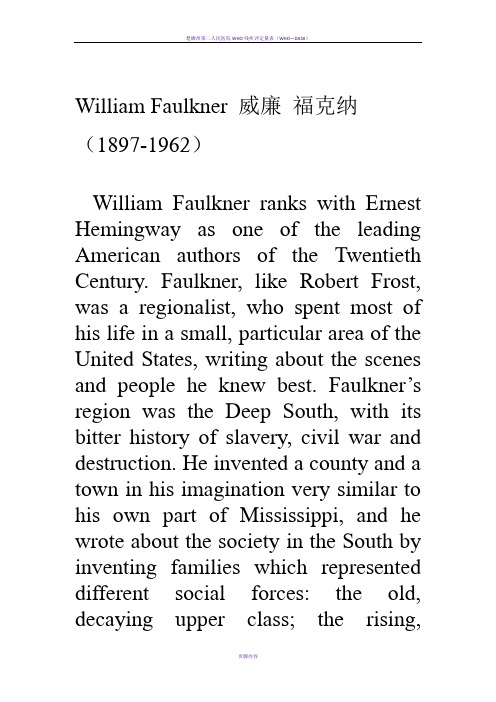
William Faulkner 威廉福克纳(1897-1962)William Faulkner ranks with Ernest Hemingway as one of the leading American authors of the Twentieth Century. Faulkner, like Robert Frost, was a regionalist, who spent most of his life in a small, particular area of the United States, writing about the scenes and people he knew best. Faulkner’s region was the Deep South, with its bitter history of slavery, civil war and destruction. He invented a county and a town in his imagination very similar to his own part of Mississippi, and he wrote about the society in the South by inventing families which represented different social forces: the old, decaying upper class; the rising,ambitious, unscrupulous class of “poor whites”; and the Negroes who labored for both of them. Most of his stories take place in this imaginary Yoknapatawpha County, and concern members of the same families at different times in history. 他的多数故事都发生在他构想的Yoknapatawpha县,他笔下的人物不是一次写完,同一人物会在几本书中,在不同历史时期反复出现。
福克纳William Faulkner简介 ppt课件
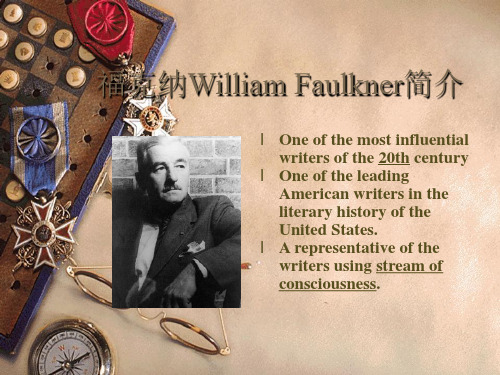
福克纳William Faulkner简介
1925, first novel published, Soldier’s Pay 《军饷》
1929, two novels: Sartoris, The Sound and the Fury 1929-1942, most productive: 2 short-story collections, a
l One of the most influential writers of the 20th century
l One of the leading American writers in the literary history of the United States.
l A representative of the writers using stream of consciousness.
volume of poetry, 11 novels Early 1940s, forgotten by the public 1945, a second rise to fame, higher than the first 1949, Nobel Prize for Literature
Major themes:
Here is “a tale/Told by an idiot, full of sound and fury,/ Signifying nothing.”
some American writers and their works
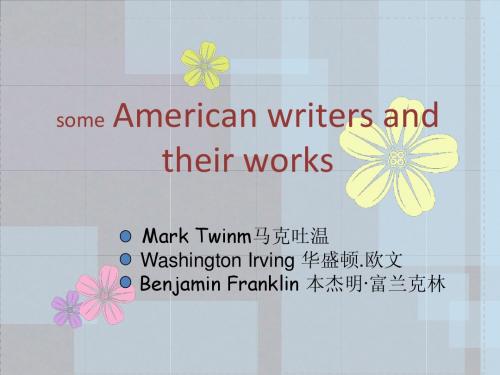
some
American writers and their works
Mark Twinm马克吐温 Washington Irving 华盛顿.欧文 Benjamin Franklin 本杰明· 富兰克林
Mark Twin (November 30, 1835 - April 21,
1910),he is the American humorist, novelist, writer, is also well-known orator, the outstanding representative of the late nineteenth Century American literary realism. Although he, but without prejudice to his superb sense of humor, wit and reputation, can be rated as one of the most famous people in the United States of america.
Writing style: melting humor and irony, wit and repartee unique combination of individuals, but also social insight and profound analysis of the humorous, both spicy small masterpiece, is most serious!
......
Washington Owen is the most famous
writers in the United States in nineteenth Century, known as the father of American literature. April 3, 1783 born in New York to a wealthy family. Erwin from childhood to like reading the English writer Scott, Byron and Burns's works. The first important works of Erwin's "history of New York". In 1820, Erwin published the "sketch book", caused by European and American literature circle's attention, Erwin laid the position in the history of American literature of this work
william Faulkner
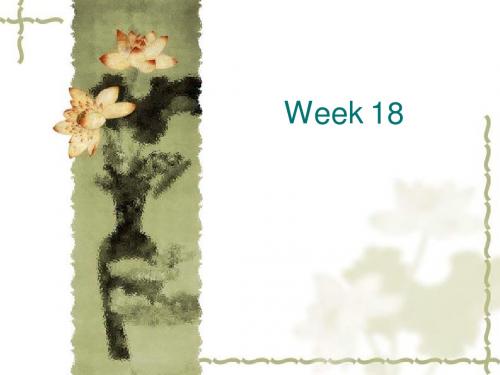
Yoknapatawpha county 约克纳帕塔法县 as the setting
Most of his works are set in the American South, an imaginary place based on F’s childhood memory about the town of Oxford in his native Lafayette County, Louisiana.拉法叶 Yoknapatawpha County has become an allegory or a parable of the Old south/ show a panorama of the experience and consciousness of the whole southern society The Yoknapatawpha saga is Faulkner’s real achievement.
Literary significance and criticism
A prominent place among the greatest of American novels, considered as one of the 100 greatest books of all time. The technique of its construction: Faulkner’s uncanny ability to recreate the thought patterns of the human mind, even the disabled one An essential development in the stream-ofconsciousness narrative technique.
VOA原文b005 威廉 福克纳 获得了1949年诺贝尔文学奖
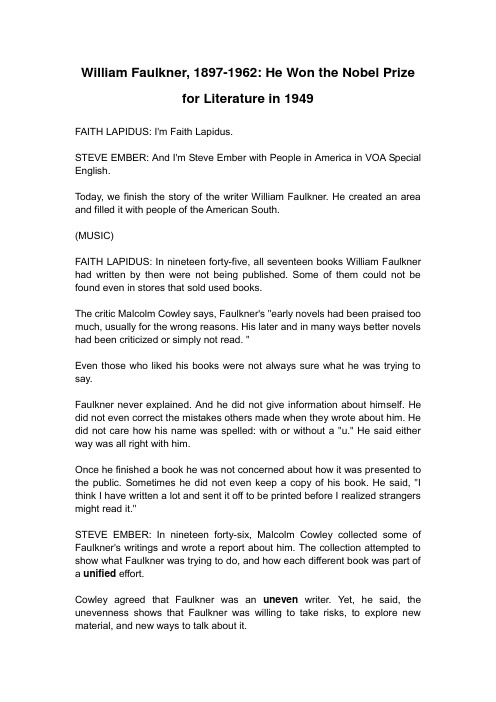
William Faulkner, 1897-1962: He Won the Nobel Prizefor Literature in 1949FAITH LAPIDUS: I'm Faith Lapidus.STEVE EMBER: And I'm Steve Ember with People in America in VOA Special English.Today, we finish the story of the writer William Faulkner. He created an area and filled it with people of the American South.(MUSIC)FAITH LAPIDUS: In nineteen forty-five, all seventeen books William Faulkner had written by then were not being published. Some of them could not be found even in stores that sold used books.The critic Malcolm Cowley says, Faulkner's "early novels had been praised too much, usually for the wrong reasons. His later and in many ways better novels had been criticized or simply not read. "Even those who liked his books were not always sure what he was trying to say.Faulkner never explained. And he did not give information about himself. He did not even correct the mistakes others made when they wrote about him. He did not care how his name was spelled: with or without a "u." He said either way was all right with him.Once he finished a book he was not concerned about how it was presented to the public. Sometimes he did not even keep a copy of his book. He said, "I think I have written a lot and sent it off to be printed before I realized strangers might read it."STEVE EMBER: In nineteen forty-six, Malcolm Cowley collected some of Faulkner's writings and wrote a report about him. The collection attempted to show what Faulkner was trying to do, and how each different book was part of a unified effort.Cowley agreed that Faulkner was an uneven writer. Yet, he said, the unevenness shows that Faulkner was willing to take risks, to explore new material, and new ways to talk about it.In nineteen twenty-nine, in his novel "Sartoris," Faulkner presented almost all the ideas he developed during the rest of his life. Soon after, he published the book he liked best, "The Sound and the Fury." It was finished before "Sartoris," but did not appear until six months later.FAITH LAPIDUS: In talking about "The Sound and the Fury," Faulkner said he saw in his mind a dirty little girl playing in front of her house. From this small beginning, Faulkner developed a story about the Compson family, told in four different voices. Three of the voices are brothers: Benjy, who is mentally sick; Quentin, who kills himself, and Jason, a business failure. Each of them for different reasons mourns the loss of their sister, Caddie. Each has a different piece of the story.It is a story of sadness and loss, of the failure of an old Southern family to which the brothers belong. It also describes the private ideas of the brothers. To do this, Faulkner invents a different way of writing for each of them. Only the last part of the novel is told in the normal way. The other three parts move forward and back through time and space.STEVE EMBER: The story also shows how the Compson family seems to cooperate in its failure. In doing so the family destroys what it wants to save.Quentin, in "The Sound and the Fury," tries to pressure his sister to say that she is pregnant by him. He finds it better to say that a brother and sister had sex together than to admit that she had sex with one of the common town boys of Jefferson.Another brother, Jason, accuses others of stealing his money and causing his business to fail. At the same time, he is stealing from the daughter of his sister. Missus Compson, the mother in the family, says of God's actions: "It can't be simply to. . . hurt me. Whoever God is, he would not permit that. I'm a lady. "FAITH LAPIDUS: Some of the people Faulkner creates, like Reverend Hightower in "Light in August," live so much in the past that they are unable to face the present. Others seem to run from one danger to another, like young Bayard Sartoris, seeking his own destruction. These people exist, Faulkner says, "in that dream state in which you run without moving from a terror in which you cannot believe, toward a safety in which you have no...[belief]. "As Malcolm Cowley shows, all of Faulkner's people, black or white, act in a similar way. They dig for gold after they have lost hope of finding it -- like Henry Armstid in the novel, "The Hamlet." They battle and survive a Mississippi floodfor the reward of returning to state prison -- as the tall man did in the story "Old Man." They turn and face death at the hands of a mob -- like Joe Christmas does in the novel, "Light in August." They act as if they will succeed when they know they will fail.(MUSIC)STEVE EMBER: Faulkner's next book, "As I Lay Dying," was published in nineteen thirty. It is similar to "The Sound and the Fury" in the way it is written and in the way it deals with loss. Again Faulkner uses a series of different voices to tell his story. The loss this time is the death of the family's mother. The family carries the body through flood and fire in an effort to get her body to Jefferson to be buried.Neither "As I Lay Dying" nor "The Sound and the Fury" was a great success. Faulkner did not earn much money from them. He was adding to his earnings by selling short stories and by working from time to time on movies in Hollywood. Then to earn more money, he wrote a book full of sex and violence. He called it "Sanctuary."When the book was ready to be published, Faulkner went to New York and completely rewrote it. The changes were made after it was printed. So Faulkner had to pay for them himself.FAITH LAPIDUS: The main person in "Sanctuary" is a man called Popeye. He is a kind of mechanical man, a man, Faulkner says, without human eyes. Faulkner says he is a person with the depth of pressed metal. For Faulkner, Popeye represents everything that is wrong with modern society and its concern with economic capitalism.Popeye is a criminal, a man who "made money and had nothing he could do with it, spend it for." He knows that alcohol will kill him like poison. He has no friends. He has never known a woman.In later books he appears as a member of the Snopes family. The Snopes are a group of killers and barn burners. They fear nothing, except nature. They love no one, except themselves. They cheat everyone, even the devil. They live in a private land without morals. Yet Flem Snopes ends as the president of the bank in Jefferson.Like Popeye, they gain the ownership and use of things, but they never really have them. Flem Snopes marries into a powerful family but his wife does not even have a name for him. She calls him "that man."。
威廉福克纳诺奖致辞 读后感英语

威廉福克纳诺奖致辞读后感英语1When I read William Faulkner's Nobel Prize acceptance speech, I was deeply moved and enlightened. How powerful his words are! They are like a bright light shining into the depths of my soul.In his speech, I felt the tremendous power of literature. It made me realize that reading and writing are not just hobbies, but a way to explore the world and understand humanity. His words inspired me to insist on reading and writing, as if they were a constant source of strength, pushing me forward on this path.Moreover, Faulkner's profound insight into human nature really changed my view of others. I began to understand that everyone has their own complexity and struggles. It made me more empathetic and less judgmental. I couldn't help but ask myself: How many times have I misunderstood others due to my own shallowness? How many beautiful souls have I failed to discover?This speech is truly a precious gift. It has made me more determined to pursue the truth and beauty in literature and life. I believe that as long as I keep learning and reflecting, I will also be able to find my own voice and make a contribution to this world!After reading William Faulkner's Nobel Prize acceptance speech, I was deeply moved and enlightened. His words were not just a simple expression of gratitude but a profound exploration of the essence of literature and the responsibility of human beings.Faulkner emphasized the social responsibility that writers should bear. This made me reflect on my own role and actions in society. In today's complex and diverse world, are we fulfilling our duties towards our fellow human beings? His words questioned my conscience and made me realize that we should not be indifferent to the sufferings and joys of others.Also, from his speech, I perceived his unwavering pursuit of art. It made me think about the current development trend of culture and art. In an era dominated by commercialization and quick consumption, are we still insisting on the true value and depth of art? Faulkner's insistence on the truth and beauty of art serves as a reminder for us to not lose our direction in the pursuit of cultural and artistic creation.In conclusion, Faulkner's speech is like a bright light, guiding me to think more deeply about society and art. It urges me to take on more responsibilities and pursue higher artistic realms. How wonderful and thought-provoking his words are!After reading William Faulkner's Nobel Prize acceptance speech, I was deeply moved and enlightened! How powerful and inspiring his words were!Faulkner's emphasis on the responsibility of writers to explore the truth and complexity of the human heart has truly opened a new door for my writing. His insistence on delving into the depth of human nature has made me realize that a great work should not only be beautiful in language but also profound in thought. It has encouraged me to be bolder in digging into the inner world of characters when I create.His respect for literary tradition has also prompted me to re-examine classic works. I began to understand that the wisdom and experience accumulated in those classics are invaluable treasures. They are like guiding stars, shining a light on my writing path.Oh, how I wish I could have such profound insights and firm beliefs as Faulkner in my literary creation! I believe that with his inspiration, I will be more passionate and persistent on this road of writing. I will strive to create works that touch people's hearts and leave a mark on the literary world.4After reading William Faulkner's Nobel Prize acceptance speech, Iwas deeply moved and enlightened! His words were like a powerful torch, shining light on the profound significance of literature in the journey of human civilization.Faulkner emphasized the crucial role of literature in inheriting history. Through vivid stories and profound insights, literature preserves the wisdom and experiences of the past, allowing us to connect with our roots and understand the footsteps of our predecessors. Isn't this a precious gift?Moreover, his speech also touched upon the shaping of values. Literature has the power to influence our thoughts and actions, guiding us towards kindness, justice, and love. How important is this in a world full of confusion and temptation?As for the future of literature, Faulkner's展望made me ponder. Will literature continue to evolve and adapt to the changing times? Will it still have the power to inspire and transform? The answer, I believe, is yes!In conclusion, Faulkner's speech is not only a tribute to literature but also a call to action for all of us. Let us cherish and embrace the power of literature, for it is the soul of humanity and the hope for our future!5After reading William Faulkner's Nobel Prize acceptance speech, I was deeply moved and enlightened! How profound and inspiring his words were!In his speech, I perceived the intimate connection between literatureand life. Faulkner emphasized that literature should reflect the true essence of human existence and the complexity of human emotions. This made me realize that great literature is not just a form of entertainment, but a mirror that reflects the reality and the inner world of humanity.Moreover, his pursuit of language innovation was truly remarkable! His bold and creative use of language taught me that in writing, we should not be confined by conventions but dare to explore and experiment. It has made me question how I can break through the limitations of my own language usage and bring more vitality and depth to my works.In conclusion, Faulkner's speech was like a guiding light, leading me to think more deeply about the nature of literature. It has encouraged me to strive for excellence in my writing, to be more observant of life, and to be more courageous in the exploration of language. What a wonderful speech it was!。
英语论文扭曲的爱—艾米丽悲剧分析

本科生毕业论文(设计)册学院 XXX学院专业英语教育班级 XXXX级英语教育X班学生 XXX指导教师 XXX XXXX大学本科生毕业论文(设计)开题报告书XXXX大学本科毕业论文(设计)任务书编号:论文(设计)题目:扭曲的爱—艾米丽悲剧分析学院: XXX学院专业:英语教育班级: XXXX级英语教育X班学生姓名: XXX 学号: XXXX 指导教师: XXX 职称:教授1、论文(设计)研究目标及主要任务本论文的研究目标是探究福克纳的《献给爱米丽的玫瑰》中艾米里的悲剧原因。
主要任务是通过分析小说中艾米里的悲剧原因,引导读者更深入理解福克纳的小说中南方情怀,女性意识以及男权影响。
2、论文(设计)的主要内容本论文分为三章,第一章介绍艾米丽所生活的小镇上的居民对她的扭曲的爱,第二章阐述艾米丽的父亲对艾米丽的影响,最后一章讨论了艾米丽与荷默之间的爱。
3、论文(设计)的基础条件及研究路线本论文的基础条件是国内外不同学者对福克纳小说以及对《献给爱米丽的玫瑰》的研究。
研究路线是对艾米丽的悲剧原因从内外因进行探讨和深入分析,以对福克纳的约翰纳帕塔法世系小说进行深入理解。
4、主要参考文献Xiao, Minghan. Study on William Faulkner. Beijing: Foreign Language Teaching and Research Press, 1997Chang Yaoxin, A survey of American Literature,南开大学出版社,2008年9月第三版[美]罗德·霍顿,赫伯特·爱德华兹,《美国文学思想背景》。
人民文学出版社,1991年1月第1版。
李文俊.《福克纳传》[M].北京:新世界出版社,2003.教师:年月日教研室主任:年月注:一式三份,学院(系)、指导教师、学生各一份XXXX大学本科生毕业论文(设计)评议书XXXX大学本科生毕业论文(设计)文献综述本科生毕业论文设计题目扭曲的爱——艾米丽悲剧分析作者姓名 XXX指导教师 XXX所在学院 XXX学院专业(系)英语教育班级(届) XXX级X班完成日期 2013 年 5 月 8 日Twisted love——An Analysis of Emily‟s TragedyByXXXXPro. XXXX, tutorA Thesis Submitted to Department of EnglishLanguage and Literature in PartialFulfillment of the Requirements for the Degree of B.A in EnglishAt XXXX UniversityMay 8th, 2013iiiAbstractA Rose for Emily, written by Faulkner, is one of the best short stories in America. It was originally published in The Forum, in 1930. In 1979, the magazine Foreign Art published this story, and the scholars at home began to study Faulkner deeply of his story. According to the study of many scholars both at home and abroad in recent years, the research of “A Rose For Emily” can be divided into the following aspects: Faulkner‟s complex of the South; the Gothic and terrifying sense; the character analysis of the black slave; the image of the elder generation; feminist study; the ways of narration; comparative study and so on.The story of “A Rose for Emily” is about a southern lady, who lived under the traditional morals, after getting rid of the restrain of her despotic father, tried to pursue her love, but finally was betrayed. At last she killed her lover Homer and slept with his dead body for the rest of her time. It is a horrible story with twisted love and gothic sense.This paper tries to analyze the tragic sense of this work, the twisted love in terms to Emily, in order to find out the reasons that account for Emily‟s tragedy. This thesis consists of three chapters: the twisted love of the town‟s people, of her father, and twisted love between Emily and Homer.Key words:Emily twisted tragedy causes摘要福克纳的《献给艾米丽的玫瑰花》是美国优秀的短篇小说之一。
William Faulkner
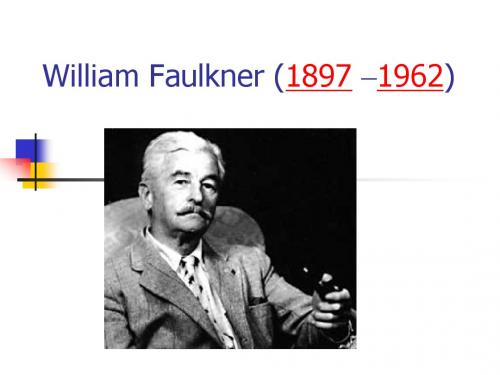
William Faulkner: Nobel Prize Acceptance Speech
I feel that this award was not made to me as a man, but to my work -- a life's work in the agony and sweat of the human spirit, not for glory and least of all for profit, but to create out of the materials of the human spirit something which did not exist before.
A Beauty
influenced by Sherwood Anderson
Although Faulkner is heavily identified with Mississippi, he was living in New Orleans in 1925 when he wrote his first novel, Soldiers' Pay, after being influenced by Sherwood Anderson to try fiction.
William Cuthbert Falkner
He was born William Cuthbert Falkner in New Albany, Mississippi, the eldest son of Murry Cuthbert Falkner (August 17, 1870–August 7, 1932) and Maud Butler (November 27, 1871–October 16, 1960). He later changed the spelling of his name to Faulkner.
威廉福克纳_简介
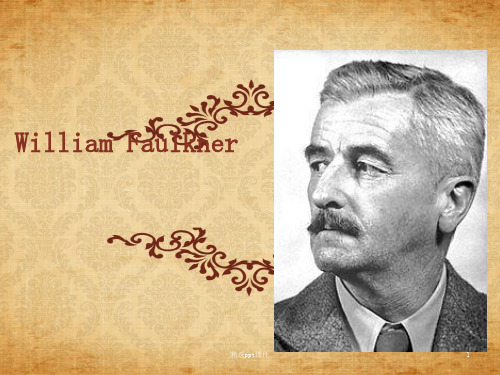
精选ppt课件
3
brief introduction
1897年9月25日-1962年7月6日,美 国小说家、诗人和剧作家,为美国文学 历史上最具影响力的作家之一,意识流 文学(stream of consciousness)在美国的 代表人物。在其40多年的创作生涯中, 他写作了19部长篇小说、125篇短篇小 说、20部电影剧本、一部戏剧,约克纳 帕塔法系列小说是其中的代表。1949年, 他因为“对当代美国小说做出了强有力 的和艺术上无与伦比的贡献”而获得诺
As I Lay Dying
Sanctuary
Light in August
喧哗与躁动 我的弥留之际 圣殿 八月之光
Vision in Spring
春景
精选ppt课件
6
1950年11月,福克纳在与阿尔贝·加缪、弗朗索瓦 ·莫里亚克、鲍里斯·帕斯捷尔纳克、约翰·斯坦贝克、 欧内斯特·海明威的角逐中获得了当年的诺贝尔文学奖。 他一开始在电话中声称不去参加典礼,并拒绝了采访。 不过,后来还是被说服。他面带病容出现在颁奖礼上, 以浓重的南方口音快速读完了预先写好的演讲词。这是 诺贝尔文学奖历史上最著名的的演说之一,福克纳预言, “人类不但会生存下去,他们还能蓬勃发展”。他反击 了评论界视他的作品为色情、怪异的指责,其声望随之 达到了顶峰。随后他去了巴黎,同让-保罗·萨特、西蒙 娜·德·波伏娃和加缪会面,又短暂游历了伦敦、爱尔 兰。
精选ppt课件
7
意 识流
意识流文学泛指注重描绘人物意识流动状 态的文学作品,既包括清醒的意识,更包括 无意识、梦幻意识和语言前意识。“意识流” 一词是心理学词汇,是美国机能主义心理学 家先驱詹姆斯创造出意识流(stream of consciousness)这个词,用来表示意识的流 动特性:个体的经验意识是一个统一的整体, 但是意识的内容是不断变化的从来不会静止 不动。意识流文学的概念是在1918年梅·辛 克莱评论英国陶罗赛·瑞恰生的小说《旅程 》时引入文学界的。
- 1、下载文档前请自行甄别文档内容的完整性,平台不提供额外的编辑、内容补充、找答案等附加服务。
- 2、"仅部分预览"的文档,不可在线预览部分如存在完整性等问题,可反馈申请退款(可完整预览的文档不适用该条件!)。
- 3、如文档侵犯您的权益,请联系客服反馈,我们会尽快为您处理(人工客服工作时间:9:00-18:30)。
Once he finished a book he was not concerned about how it was presented to the public. Sometimes he did not even keep a copy of his book. He said, "I think I have written a lot and sent it off to be printed before I realized strangers might read it. "VOICE TWO:In nineteen-forty-six, Malcolm Cowley collected some of Faulkner's writings and wrote a report about him. The collection attempted to show what Faulkner was trying to do, and how each different book was part of a unified effort.Cowley agreed that Faulkner was an uneven writer. Yet, he said, the unevenness shows that Faulkner was willing to take risks, to explore new material, and new ways to talk about it.In nineteen-twenty-nine, in his novel "Sartoris," Faulkner presented almost all the ideas he developed during the rest of his life. Soon after, he published the book he liked best, "The Sound and the Fury." It was finished before "Sartoris," but did not appear until six months later.VOICE ONE:In talking about "The Sound and the Fury," Faulkner said he saw in his mind a dirty little girl playing in front of her house. From this small beginning, Faulkner developed a story about the Compson family, told in four different voices. Three of the voices are brothers: Benjy, who is mentally sick; Quentin, who kills himself, and Jason, a business failure. Each of them for different reasons mourns the loss of their sister, Caddie. Each has a different piece of the story.It is a story of sadness and loss, of the failure of an old Southern family to which the brothers belong. It also describes the private ideas of the brothers. To do this, Faulkner invents a different way of writing for each of them. Only the last part of the novel is told in the normal way. The other three parts move forward and back through time and space.VOICE TWO:The story also shows how the Compson family seems to cooperate in its failure. In doing so the family destroys what it wants to save.Quentin, in "The Sound and the Fury," tries to pressure his sister to say that she is pregnant by him. He finds it better to say that a brother and sister had sex together than to admit that she had sex with one of the common town boys of Jefferson.Another brother, Jason, accuses others of stealing his money and causing his business to fail. At the same time, he is stealing from the daughter of his sister.Missus Compson, the mother in the family, says of God's actions: "It can't be simply to…hurt me. Whoever God is, he would not permit that. I'm a lady."VOICE ONE:Some of the people Faulkner creates, like Reverend Hightower in Array "Light in August," live so much in the past that they are unable toface the present. Others seem to run from one danger to another,like young Bayard Sartoris, seeking his own destruction. Thesepeople exist, Faulkner says, "in that dream state in which you runwithout moving from a terror in which you cannot believe, toward asafety in which you have no…[belief]."Graphic ImageAs Malcolm Cowley shows, all of Faulkner's people, black or white,act in a similar way. They dig for gold after they have lost hope of finding it --like Henry Armstid in the novel, "The Hamlet." They battle and survive a Mississippi flood for the reward of returning to state prison -- as the tall man did in the story "Old Man." They turn and face death at the hands of a mob -- like Joe Christmas does in the novel, "Light in August." They act as if they will succeed when they know they will fail. (Music)VOICE TWO:Faulkner's next book, "As I Lay Dying," was published in nineteen-thirty. It is similar to "The Sound and the Fury" in the way it is written and in the way it deals with loss. Again Faulkner uses a series of different voices to tell his story. The loss this time is the death of the family's mother. The family carries the body through flood and fire in an effort to get her body to Jefferson to be buried.Neither "As I Lay Dying" nor "The Sound and the Fury" was a great success. Faulkner did not earn much money from them. He was adding to his earnings by selling short stories and by working from time to time on movies in Hollywood. Then to earn more money, he wrote a book full of sex and violence. He called it "Sanctuary."When the book was ready to be published, Faulkner went to New York and completelyrewrote it. The changes were made after it was printed. So Faulkner had to pay for them himself.The main person in "Sanctuary" is a man called Popeye. He is a kind of mechanical man, a man, Faulkner says, without human eyes. Faulkner says he is a person with the depth of pressed metal. For Faulkner, Popeye represents everything that is wrong with modern society and its concern with economic capitalism.Popeye is a criminal, a man who "made money and had nothing he could do with it, spend it for. " He knows that alcohol will kill him like poison. He has no friends. He has never known a woman.In later books he appears as a member of the Snopes family. The Snopes are a group of killers and barn burners. They fear nothing, except nature. They love no one, except themselves. They cheat everyone, even the devil. They live in a private land without morals. Yet Flem Snopes ends as the president of the bank in Jefferson.Like Popeye, they gain the ownership and use of things, but they never really have them. Flem Snopes marries into a powerful family but his wife does not even have a name for him. She calls him "that man. "Faulkner says that nothing can be had without love. Love is the opposite of the desire for power. A person in one of Faulkner's stories says, "God created man, and he created the world for him to live in. And…He created the kind of world he would have wanted to live in if he had been a man. "(MUSIC)VOICE TWO:"Light in August" starts with the search by a woman, Lena Grove, for the man who promised to marry her. The story is also about two people who do not fit with other people. They are a black man named Joe Christmas, and a former minister John Hightower, who has lost his belief in God. Faulkner ties the three levels of individual psychology, social history, and tragedy into a whole.In nineteen-thirty-six, Faulkner followed "Light in August" with "Absalom, Absalom." Many consider this his best novel. It is the story of Joseph Sutpen, who wants to start a famous Southern family after America's Civil War. It is told by four speakers, each trying to discover what the story means. The reader sees how the story changes with each telling, and that the "meanings" are created by individuals. He finds that creating stories is the way a human being finds meaning. Thus, "Absalom, Absalom" is also about itself, as a work of the mind of man.Faulkner's great writing days were over by the end of World War Two. Near the end of his life, Faulkner received many honors for his writing. The last, and best honor, was the Nobel Prize for Literature in nineteen-fifty.In a speech accepting the award, Faulkner spoke to young writers. It was a time of great fears about the atomic bomb. Faulkner said that he refused to accept the end of the human race. He said he believed that man will not only survive, he will rule. "Man is immortal," he said, "because he has a soul, a spirit capable of compassion, sacrifice and endurance. The writer's duty is to write about these things. "William Faulkner died of a heart attack in nineteen-sixty-two. He was sixty-five years old.(THEME)VOICE TWO:This Special English program was written by Richard Thorman and produced by Lawan Davis. I'm Steve Ember.VOICE ONE:And I'm Faith Lapidus. Join us again next week for People in America in VOA Special English.(THEME)。
